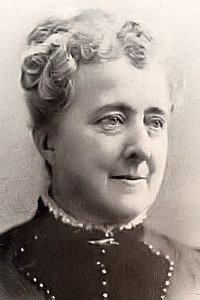Introduction

Born: January 22, 1834, Burford, Ontario, Canada.
Died: October 6, 1916, Manhattan, New York.
Buried: Green-Wood Cemetery, Brooklyn, New York.

Born: January 22, 1834, Burford, Ontario, Canada.
Died: October 6, 1916, Manhattan, New York.
Buried: Green-Wood Cemetery, Brooklyn, New York.
Jennie was the daughter of Horatio Fowler and Harriet B. Ryan, and wife of William Crossgrove Willing.
Author, preacher, lecturer and educator…she has a mixture of heroic English, Scotch and Irish blood in her veins. Her maternal grandmother was disinherited because she chose to share the wilderness perils with an itinerant minister.
Her father was a Canadian
patriot,who lost all in an attempt to secure national independence. He was glad to escape to the States with his life and his family, and to begin life again in the new West.He could give his children little more than a hatred of tyranny, constant industry, careful economy and good morals.
With this simple outfit and irrepressible love of study, his daughter began to teach school when she was fifteen years old. The next year, though a timid little body, she finished teaching the winter term of a village school, from which the
big boyshadturned outtheir young man teacher.At the age of nineteen she became the wife of a Methodist minister, and went with him to western New York. The multitudinous duties of a pastor’s wife left small time for study, but she has always had a language or a science on the tapis.
She began to write for the press at the age of sixteen years, and, besides constant contributions to papers and magazines, she has produced two serials for New York papers and ten books of no mean quality.
In 1873 she was elected professor of English language and literature in the Illinois Wesleyan University. Since then she has been connected as trustee or teacher with several first-grade literary institutions.
In 1874 she was nominated, with a fair prospect of election, to the superintendency of public instruction in the State of Illinois. On account of other duties she was obliged to decline the nomination.
Her inherited love of reform brought her to the fore when the great crusade swept over the land. For several years she was president of the Illinois Woman’s State Temperance Union.
With Emily Huntington Miller she issued the call for the Cleveland convention, and she presided over that body, in which the National Woman’s Christian Temperance Union was organized. For a few years she edited its organ, now the
Union Signal.Mrs. Willing was drawn into public speaking by her temperance zeal, and soon she found herself addressing immense audiences in all the great cities of the land.
As one of the corresponding secretaries of the Woman’s Foreign Missionary Society, she presented its claims at conferences of ministers, and in scores of large towns in different parts of the United States, interesting thousands of people in its work. For seven or eight years she has rendered similar service to the Woman’s Home Missionary Society.
As an evangelist she has held many large and important revival services, and with marked success. Since her removal to New York City, in 1889, she has had her hands full with her home mission work, her evangelistic services, her Italian mission and the bureau for immigrants, with its immigrant girls’ home, in New York, Boston, and Philadelphia.
Clear of head, warm of heart, steady of faith, her English sturdiness, Scotch persistence and Irish vivacity make her ready for every good work for Christ and His poor.
She bears the university degree of A. M.
Willard, p. 785